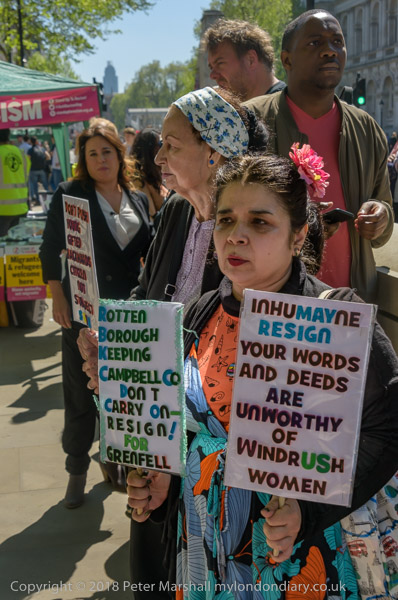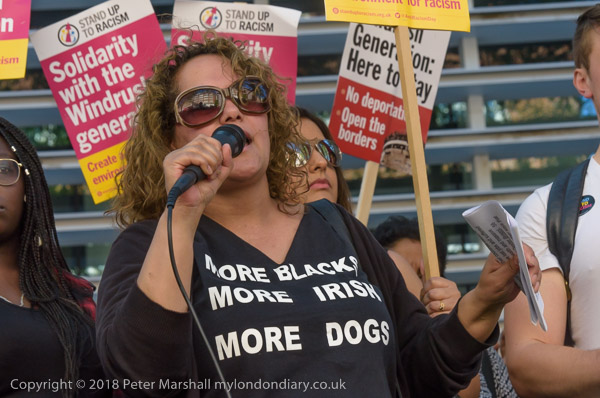
Stand Up to Racism came to Downing St to call for Theresa May’s racist 2014 Immigration Act to be repealed and for an immediate end to the deportation and detention of Commonwealth citizens, with those already deported to be bought back to the UK.

Although the 70th anniversary of the arrival of the Empire Windrush has brought the treatment of people of Commonwealth origin back into public debate, this is not a new problem. It has its roots in the kind of attitudes which we had to our Empire. The British Empire was – at least financially – a very good thing for Britain, making the country wealthy and putting the Great in Britain, which without it would have been a small country on the edge of Europe.

It was the wealth from the Empire (much of it based on slave and exploited labour in our colonies) that built our great cities and which enabled us to pursue the kind of industry and education which provided the opportunity for the Industrial Revolution in which British scientists and engineers played such a leading role.

Of course there were many great myths of the empire, including a conviction of racial superiority which enabled us to see it as a civilising mission as it was destroying existing civilisations. And it wasn’t all bad, and at least in some places it did improve the lot of some of those who became British, and, at least until 1948, all those born anywhere in His Majesty’s dominions were automatically British subjects, as well as any child whose father was a British subject and any woman who married a British subject. These rights, which existed under Common Law, were codified by the 1914 Aliens Act.
Things became more complicated after the Second World War – and many British subjects from across the Empire fought in both World Wars. The 1948 British Nationality Act made all of us in the UK and its remaining colonies a ‘Citizen of the United Kingdom and Colonies’ and until 1962 this generally included the right to come and live and work in the UK. The Commonwealth Immigration Act brought in under Harold Macmillan then removed that right for Commonwealth citizens and immigration controls were then put in place. Edward Heath’s 1971 Immigration Act brought in a new concept, patriality, restricting the right of abode to those who were born in the UK, or had parents or grandparents who were born here. This actually prevents some British nationals from living here and is in breach of international law and the Fourth Protocol to the European Convention on Human Rights.
Further restrictions came with Margaret Thatcher and the British Nationality Act 1981, which essentially set the current pattern. All the major restrictions on immigration have been brought in under Conservative governments, though there were some minor changes when Labour was in power, including the right to deprive people of British nationality.

Theresa May’s personal contribution during her time at the Home Office was the establishment of a ‘hostile environment’ through the Immigration Act 2014. Perhaps even more important than the actual legislation was the creation of a hostile and uncaring culture within the Home Office, and her work with the UK Border Agency and its replacement in 2013 by the UK Border Force and Immigration Enforcement.
Windrush rally against Theresa May
Windrush Immigration Act protest
______________________________________________________
There are no adverts on this site and it receives no sponsorship, and I like to keep it that way. But it does take a considerable amount of my time and thought, and if you enjoy reading it, a small donation – perhaps the cost of a beer – would be appreciated.
My London Diary : London Photos : Hull : River Lea/Lee Valley : London’s Industrial Heritage
All photographs on this and my other sites, unless otherwise stated, are taken by and copyright of Peter Marshall, and are available for reproduction or can be bought as prints.
To order prints or reproduce images
________________________________________________________